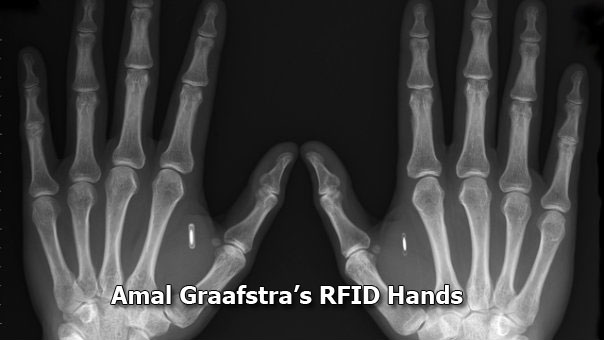SCDigest has written several times in the past about humans getting RFID implants, such as a man named Amal Graafstra did in the state of Washington in 2010.
Graafstra had two different chips embedded, one in each hand, and he uses this technology to open his garage door, turn on his computer and much more by simply waving his hand at them. (See Are RFID Tagged Humans Closer than we Think?)
Supply Chain Digest Says... |
 |
| Pioneer body hacker Graafstra himself explained that the technology he has implanted into his body has "given me the ability to communicate with machines. It's literally integrated into who I am." |
 |
What do you say? |
| Click here to send us your comments |
 |
| Click here to see reader feedback |
|
|
Then in 2015 we published an article about office complex in Sweden that was encouraging workers there to also get RFID implants and use them to do such things as pay for lunch, access the copy machine, open office doors and more. (See Office Complex in Sweden Offers Option of Embedded RFID for Workers to Automate Access, Buy Lunch.)
Not much word since then as to how the program is coming along. We are thinking rather slowly.
Later in 2015, we wrote how "transhumanist" Zoltan Istvan had also jumped on the bandwagon. What is a transhumanist, you ask? Someone who believes the idea that human capacity can be enhanced by technology.
Back then, Istvan had just received his first RFID implant, and though he apparently had no real applications to use the new chip, in a web post he was optimistic that the chip's ability to "store information and unlock devices, among other things," would eventually come in handy. He did report seeing someone who could start their car with an RFID implant and found that pretty cool.
Then earlier this year, we ran a story on how Graafstra is now the president of Dangerous Things, a company which designs, sells and sometimes installs its own line of implantable RFID chips.
It turns out all the publicity Graafstra generated from his implants led to many calls from others around the world interested in chips for themselves. In 2013, Graafstra decided he could make a real business out of it.
"I needed a way to help people out who were contacting me and make it worth my while," said Graafstra. "Our premise here is to upgrade your life. Open your doors, your cars and your computers [with a chip]."
Graafstra said his bootstrapped company as of June had sold more than 10,000 implantable RFID chips and the do-it-yourself kits to install them under the skin to people across the globe. Each kit costs about $100.00, and includes the tag itself, an antiseptic, and injection tool needed to install it under the skin. Four different types of chip implants are available.
(See More Below)
|
CATEGORY SPONSOR: SOFTEON |
|
|
| |
|
|
Dangerous Things had revenues of about $150,000 in 2015, up 50% from 2014. That's pretty impressive growth.
So, if all that is not enough for you to give Dangerous Things a call, perhaps the latest news on what is increasingly called "body hacking" may be the trigger.

News Corp Australia reported this week that "It may sound like sci-fi, but hundreds of Australians are turning themselves into super-humans who can unlock doors, turn on lights and log into computers with a wave of the hand."
News Corp. added that this in part is the result of "a clever propaganda campaign that equates RFID microchipping with becoming "superhuman," and people are begging for it."
Begging for it, they say.
It quotes one body hacker, who now has a small business distributing implant kits, as saying that her friends and family are envious of her microchip lifestyle.
"My nana wants one. I've had more opposition to my tattoos than I've ever had to the chip. My friends are jealous," she says
In another interview with News Corp., pioneer body hacker Graafstra himself explained that the technology he has implanted into his body has "given me the ability to communicate with machines. It's literally integrated into who I am."
An outfit called Global Research, which clearly does not like this development, commented on all this that "the push for RFID microchipping and assimilating the human population with robots and technology, is something that will most likely be sold to the public as helping them to become "super human," but clearly if you become part machine/computer, that means there will be someone who can control that technology."
Global Research also noted that in 2010, CBS news reported that the Australian government had a potential RFID microchipping plan in the works related to the health care system - though thankfully it doesn't seem to have moved forward from there.
So are you ready to be a super-human? SCDigest thinks it can wait.
Do you see this implant movement actually taking off? Would you ever do it? Let us know your thoughts at the Feedback button below.
Your Comments/Feedback
|